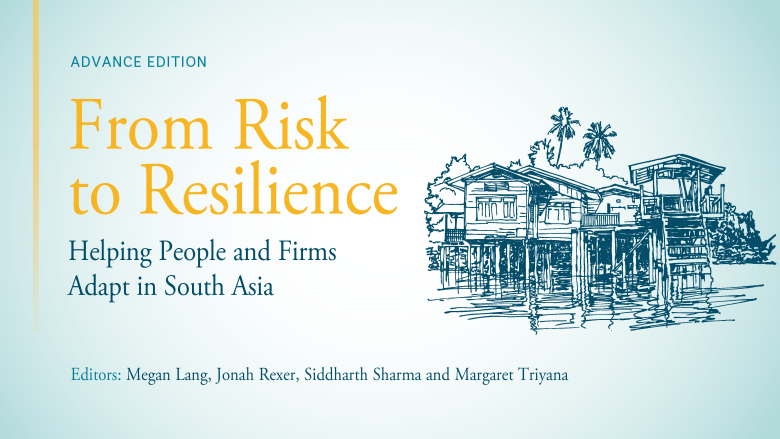FULL REPORT | EXECUTIVE SUMMARY | PRESS RELEASE | CHARTS & DATA

South Asia is the most climate-vulnerable region among emerging markets and developing economies. With governments having limited room to act due to fiscal constraints, households and firms will shoulder most of the burden of climate adaptation. This book documents the extent to which households and firms are aware of climate risks, are taking actions, and are hindered in their actions by their circumstances. The findings point to actions that even fiscally constrained governments can take to help their households and firms build climate resilience. The book draws on extensive global experience to offer detailed policy options for vulnerable sectors and groups.
PRAISE FOR THE BOOK
“By providing an analytically rigorous, evidence-based and comprehensive treatment of climate adaptation in South Asia, this book is a model for how to use economics to help poor people. It will definitely feature in my syllabus, as well as many others.”
—Shanta Devarajan
Professor of the Practice of International Development, Edmund A. Walsh School of Foreign Service, Georgetown University
— • —
"This is a timely report for at least two reasons. First, recent disaster events and longer-run environmental changes across South Asia, ranging from massive floods in Pakistan, heat waves across India, and increase in water and soil salinity in coastal areas of Bangladesh, West Bengal and Orissa, imply the climate crisis is already affecting millions of lives. It has become urgent to give private and public sector decision-makers in the region some ideas for policy tools to deal with these crises. Second, because households and firms have already started experiencing these changes, social scientists can finally observe how people mitigate and adapt to these shocks. This implies that the new insights that are now emerging from research studies based on actual empirical observations of people’s reactions to shocks are more robust and dependable than past studies that relied on counterfactual modeling of future climate scenarios. Social science research is on much more solid footing when we analyze observations of actual changes, than on predictions of future changes. It is important for the World Bank to use its considerable convening power and analytical capabilities to summarize and highlight these new insights for decision-makers in the region.”
—Ahmed Mushfiq Mobarak
Kasoff ’54 Professor of Economics and Management, Yale University
